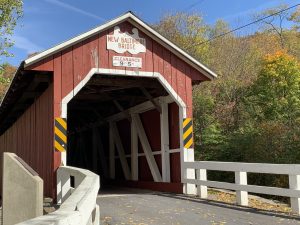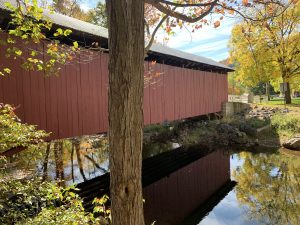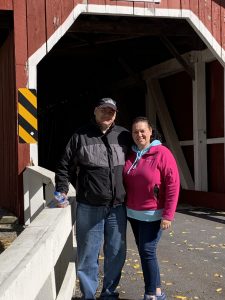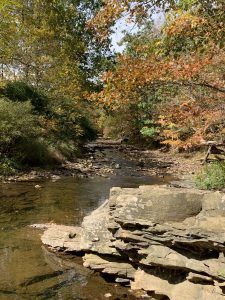 This past weekend, my husband and I had the opportunity to get away on a couples retreat with our Connect group from church. We headed to the foothills of the Allegheny Mountains near Bedford, Pennsylvania where we enjoyed a relaxing weekend surrounded by the array of colors as fall showed its glory.
This past weekend, my husband and I had the opportunity to get away on a couples retreat with our Connect group from church. We headed to the foothills of the Allegheny Mountains near Bedford, Pennsylvania where we enjoyed a relaxing weekend surrounded by the array of colors as fall showed its glory.
On our drive home, we ventured to a little out-of-the-way spot so I could take a peak at one of Pennsylvania’s quaint covered bridges. Here, on the back roads of Somerset County we found the New Baltimore Covered Bridge.
Immediately, I was transported back in time to the simpler eras I choose to write about in my stories. In hushed silence, I strained to hear the sound of clomping hooves against the bridge’s plank flooring transporting courting lovers or Sunday church goers. I’m pretty sure I audibly sighed.
The picturesque setting of the lovely covered red bridge over the rustling waters of the Raystown Branch of the Juniata River made me wonder about these historical treasures. Here beside this rural bridge to nowhere, we were able to scan a QR code of all things and quickly learned that the New Baltimore covered bridge is one of only 814 such bridges remaining in the United States. During their hey dey of construction between 1825-1875, more than 14,000 covered bridges dotted the American landscape.
 Though not distinctly American, they have become a symbol of America’s architectural past with many towns across the country choosing now to restore these treasures rather than replace them with modern bridges of steel and asphalt.
Though not distinctly American, they have become a symbol of America’s architectural past with many towns across the country choosing now to restore these treasures rather than replace them with modern bridges of steel and asphalt.
The original reason for the cover was to protect the bridge’s trusses and decks from snow and rain, preventing decay and rot. Covering the bridge extended the life of the structure from 20 years to a whopping 100. The cover served other purposes also—keeping horses from being spooked by the waters underneath, providing a reprieve from weather to the weary traveler, and as a backdrop for political rallies or religious meetings. History also records town meetings, poker parties, sweethearts’ rendezvous, dances, and even rainy-day luncheons all taking place under the shelter of these beautiful bridges.
 Pennsylvania has boasting rights not only to being the home of the first covered bridge built in 1805 across the Schuylkill River in Philadelphia, but it also ranks as the state with the most covered bridges—219 to be exact and you can find them sprinkled among 40 of the state’s 67 counties. The longest covered bridge in history was built in 1814 in Lancaster County, Pa., at a distance of 5,960 feet—more than a mile in length. Unfortunately, it was destroyed in 1832 by ice and high water.
Pennsylvania has boasting rights not only to being the home of the first covered bridge built in 1805 across the Schuylkill River in Philadelphia, but it also ranks as the state with the most covered bridges—219 to be exact and you can find them sprinkled among 40 of the state’s 67 counties. The longest covered bridge in history was built in 1814 in Lancaster County, Pa., at a distance of 5,960 feet—more than a mile in length. Unfortunately, it was destroyed in 1832 by ice and high water.
Whether you’re a history buff like myself yearning for a snippet of a by-gone era or just looking for a wonderful venue to hike, explore, picnic, or just enjoy the fall foliage, I encourage you to seek out one of these local treasures (click here for the official list of covered bridges in the U.S.). They make a pretty darn good excuse for a road trip, if I do say so myself.
Join the Conversation: Do you think exploring America’s covered bridges would make a fun road trip?

